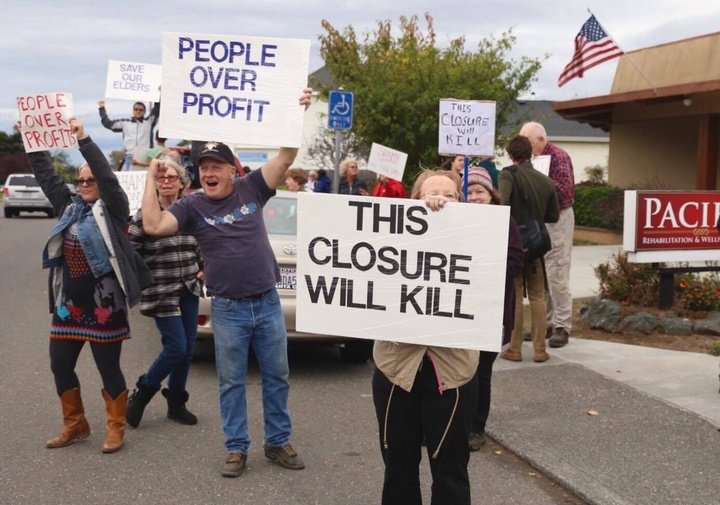
Protesters last year picketing outside Pacific Rehabilitation & Wellness Center, one of five local facilities owned by Rockport Healthcare Services. | File photo: Andrew Goff.
PREVIOUSLY:
- State Unlikely to Block Closure of Local Skilled Nursing Facilities
- Skilled Nursing Homes’ Closure Plan Denied by State Public Health Department … For Now
- State Lawmakers Fighting to Prevent Closures of Local Skilled-Nursing Facilities
- Three Skilled Nursing Homes Closing: Rockport Receives Approval from State Regulators
- Skilled Nursing Corporation Blames Planned Closures on Marijuana, Medi-Cal Provider
- ‘SHAME ON SHLOMO’: Citizens Protest the Pending Closure of Local Nursing Homes
- Competing Protests With a Shared Goal: Keeping Eureka’s Skilled Nursing Facilities From Closing
- UPDATED: Rockport Owner Changes Plans, Says Two of Three Skilled Nursing Homes Slated for Closure Will Remain Open
- ‘Like Extortion’: Senator McGuire Says Rockport Still Angling For Higher Medi-Cal Rates at Skilled Nursing Homes
- Rockport Healthcare Changes Course (Again), Opts Not to Cancel MediCal Contracts With Skilled Nursing Homes
From Assemblymember Jim Wood’s office:
SACRAMENTO—On Friday, Governor Brown signed AB 275 by Assemblymember Jim Wood (D-Healdsburg). This bill protects residents of skilled nursing facilities when those facilities have a change in license status or operation, such as closure.
“Residents of skilled nursing facilities are among our most vulnerable citizens and they must be protected,” said Wood.
Last year, Rockport Healthcare Services, the owner of the only skilled nursing facilities in the Eureka area, announced that it was closing three of its five facilities. More than 100 residents were going to be displaced and moved far from their families. Despite an outpouring of support for the residents from the community, and many meetings with stakeholders, including the Department of Public Health, Partnership Health Plan, and Asm. Wood and Senator Mike McGuire, initially Rockport showed no interest in changing its plans.
“It’s very likely that the community’s efforts, the media coverage and the many meetings held may have caused Rockport to reconsider as they subsequently decided to close only one facility,” said Wood.
“During those many months,” said Wood, “residents and their families were on a roller coaster ride of anxiety. It became obvious to me that new protections would have to be put in place to prevent this trauma from happening to other residents in the future.”
This bill increases the timeline and notice periods, from 30 to 60 days, that long-term care (LTC) facilities are required to give residents, their families, the Department of Public Health (DPH), the Department of Health Care Services (DHCS) and the Office of the State LTC Ombudsman when they are planning to close.
Other benefits of the bill include requiring the resident’s physician or facility medical director to provide a more comprehensive medical and social assessment of each resident in an effort to prevent and reduce any trauma that might occur during their transfer to another facility and places more responsibility on these facilities for the welfare of their residents and their families and for the impact closure might have on the whole community. “If they haven’t considered all those factors,” said Wood, “DPH now has the authority to reject their plan.”
“Although this was an issue that directly affected a rural community I represent, this situation could occur anywhere in California where beds are limited or similar ownership situations exist, so I am very pleased that this bill will become law in January,” said Wood.
CLICK TO MANAGE